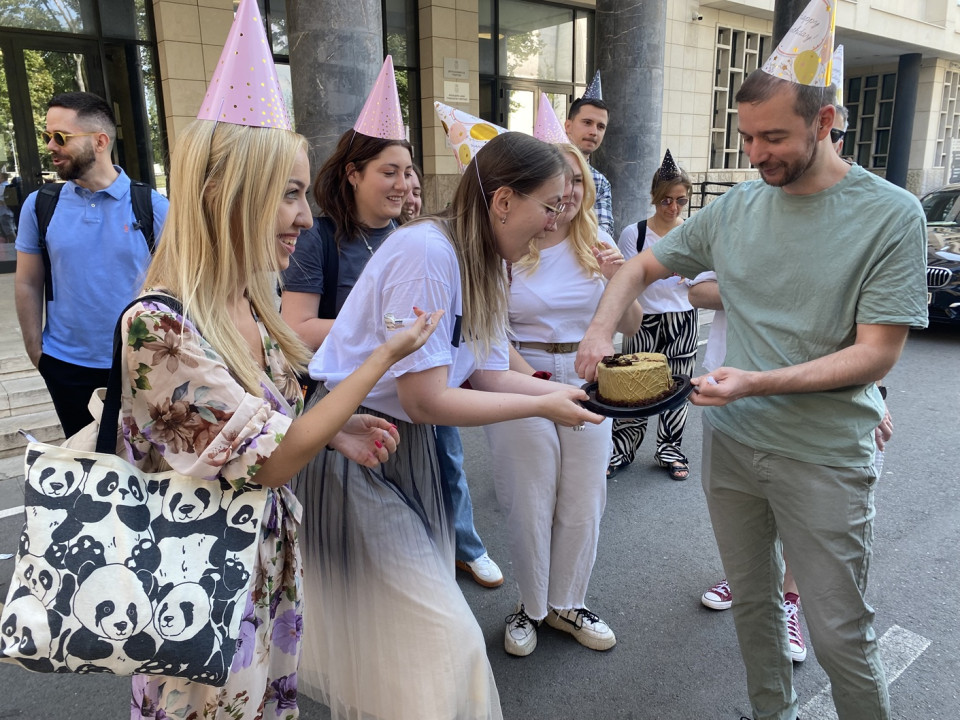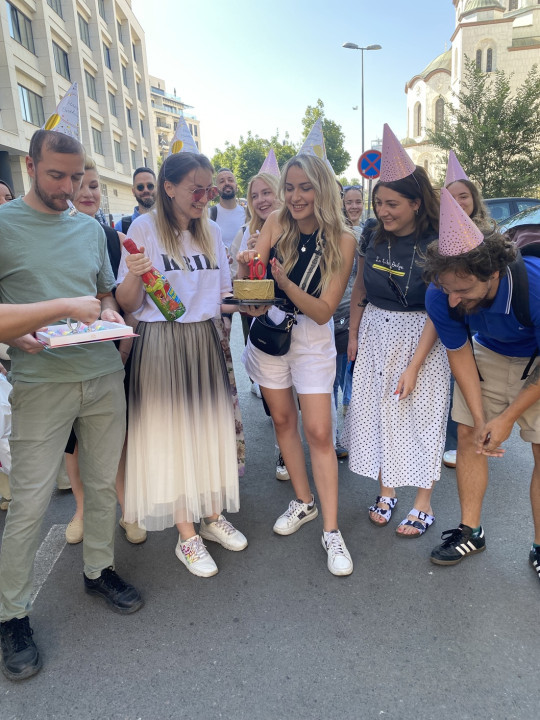10 years of KRIK – a decade of excellence in investigative journalism
Written by: Veran Matić
When you visit the KRIK website and open the page About Us, you find yourself in disbelief.

First, you will see that they have nothing to hide and that the years-long regime narrative about them does not correspond to the photographs, biographies, and everything that is presented to the public more than transparently.
You will notice how much important and significant content they produce - it is a true treasure trove of first-class investigative stories, content from RasKRIKavanje or the database of politicians' assets from the current government and opposition, the Prosudi ko sudi database - which contains information about the judges presiding over the most important cases. There is also the database of mafia killings Crna knjiga, as well as profiles of gang leaders on the page Šefovi podzemlja.
The KRIK editorial team engages in investigative journalism, undoubtedly the most challenging and often the most thankless job in the media sphere. Investigative journalism requires exceptional dedication to the fundamental tenets of journalism, incredible energy, patience, perseverance, great knowledge, and even greater courage.
Today, in all countries around the world, such editorial teams are undesirable: in some, they are seen as a necessary evil, but most often as enemies, often greater than, for example, the political opposition or dissidents. In our country, investigative journalists are most often persecuted and harassed precisely because they work in the public interest. As much as we recognize KRIK through the harsh attacks of politicians, tycoons, and other powerful figures, as the public, we value their outstanding articles, investigative stories, and databases from which we can draw conclusions ourselves, which is why every one of their stories raises incredible dust. One story leads to a series of new ones that expose the anomalies of the society we live in, with precise and indisputable arguments and evidence.
In the past ten years, most of KRIK's investigative stories have not escaped serious national and international professional recognition and awards (Data Journalism Award, Sigma Award, CEO SEEMO Award for Outstanding Achievements in Investigative Journalism, Anti-Corruption Champions Award, Global Shining Light Award, European Press Prize, awards for ethics and courage “Dušan Bogavac” and “Jug Grizelj”, regional awards “Srđan Aleksić” and “Duško Jovanović”). The journalists of KRIK have repeatedly been recipients of the EU Award for Best Investigative Stories from Serbia, as well as the national award “Dejan Anastasijević”.

This seemingly small editorial team enjoys immense support from the silent majority in Serbia, who eagerly await new content. This same public strives to support the editorial's work through donations – in which this close connection with the public represents the greatest recognition for the editorial team. (I know many people from various sectors of society who regularly make donations to KRIK - however small they may be, these donations are material assistance but, above all, direct support for the idea of a transparent, open, and accountable society and government that works in the public interest.)
The KRIK editorial team has always been comprised mainly of female journalists. Currently, the ratio is 13:6 in favor of female journalists. I truly believe that this is one of the reasons why KRIK is such a strong editorial team. I have often witnessed the strength and professionalism, commitment to fundamental tenets, not only of the profession but also to the most important life values of the KRIK editorial team. This is an editorial team that constantly operates in extraordinary circumstances (prior to the founding of KRIK, several leading journalists worked at CINS, the Center for Investigative Journalism).
Readers become accustomed to stories that they read with both enjoyment and horror, forgetting how much courage it takes for someone to spend years in the triangle between organized crime, big “business,” and politics. This is the most dangerous space in which a journalist can find themselves in peacetime. People get used to reading stories and forget how exhausting and stressful it is to engage in this work, even for a month. Yet, the resistance provided by this editorial team is insurmountable for any form of repression.
It seems to me that there is no more established group of accounts on social media. When new KRIK content sees the light of day, it is when you can best see the internal unity, cohesion, mission, and strategy that guide them. Of course, there is also a strong intertwining with the public, the audience.
In the case of KRIK, courage is taken for granted. That’s why I didn’t start the text with the problems they face. Recently, they discreetly boasted that they are the first media outlet in Serbia to receive an international certificate of journalistic excellence, which is in some sense a greater recognition than prestigious awards, as they come for specific articles or investigations, while this certificate indicates that the entire editorial team consistently adheres to all professional standards at a global level.
Precisely because of these standards and reputation, the most influential politicians and those who have enabled them to become enormously wealthy do not hide their incredible disdain for every article and the editorial team. To such an extent that they retaliate in various ways: lawsuits with elements of SLAPP (flooding with lawsuits aimed at intimidating them, financially exhausting them, and taking away valuable time with court obligations), orchestrated campaigns, brutal attempts at discrediting, incredible lies, and dangerous targeting.
In every situation, KRIK's response is dignified, thorough, with a lot of knowledge about rights, laws, and with a strong conviction in the correctness of everything that has been investigated and published. I regret that, for example, journalism students and journalists do not attend the numerous trials to which the KRIK editorial team is subjected, as they would learn a lot about journalism and the rule of law, as well as about the practices against journalism that works in the public interest. Always well prepared, the accused journalists and their legal representative readily defend their stated positions and claims, impressing all who care about the true values of the journalistic profession and the fight for the rule of law. This is another battle they fight, alongside the one for professional investigative journalism. They invest enormous effort, time, and resources in the fight against incredible lies and slander, against lawsuits aimed solely at stopping or hindering their work, against threats of severe penalties, judicial practices that are changing and becoming increasingly hostile to professional journalism.

When looking at the records of the Supreme Public Prosecutor's Office, maintained since 2016 when the Permanent Working Group for the Safety of Journalists was established, we observe that all cases of threats to safety have been duly reported in the case of the KRIK editorial team - three break-ins into apartments from which nothing valuable was stolen occurred only to the female journalists of this editorial team. To date, no case has been resolved. Reported stalking and surveillance cases also remain unresolved. Numerous threats have resulted in international warrants, translation of cases into records of unknown perpetrators, dismissals of criminal charges, or still open requests to the police to gather the necessary information. In the past nine years, only one case of an attack on KRIK has been resolved with a conviction (one year in prison, suspended for three years).
At this moment, the KRIK editorial team is facing more than 15 lawsuits and court processes in cases with elements of SLAPP lawsuits, the most in Serbia, and perhaps in the region.
When looking at the database of attacks on journalists maintained by NUNS, from the establishment of KRIK to the present day, six verbal threats, four attacks on property (break-ins into apartments and seizure of phones used to record events), and 27 threats have been recorded (among them are statements and lawsuits, and the list includes the most powerful people in the country, from Prime Minister and then Speaker of the Assembly Ana Brnabić, through the heads of BIA, Aleksandar Vulin, Vladimir Orlić, and Bratislav Gašić, ministers Siniša Mali, Nebojša Stefanović, Jelena Tanasković, Nenad Popović (who has sued four times and never appeared in court, costing the editorial team a lot of precious time), police strongmen like Dijana Hrkalović, MPs Aleksandar Martinović, Vladimir Đukanović, businessmen close to the government like Nikola Petrović and Bogoljub Karić, accused in major cases like Predrag Koluvija, but also judges, such as Dušanka Đorđević, who, along with her lawyer husband, demands prison and financial penalties and a ban on work due to truthful information taken from public sources... The concentration of hostility and power behind the unresolved threats, attacks, and pressures on the KRIK editorial team – from criminal, through tycoon, and political threats to life, lawsuits aimed at financially exhausting them, and threats of prison sentences, makes this editorial team the most endangered in the region.
Today, July 8, the KRIK editorial team marked ten years of serious work, in front of the court and in the courtroom where they are being tried on the lawsuit of Judge Đorđević. There is no greater symbolism for the position of the KRIK editorial team and journalism in today's Serbia. There is also no stronger resistance than that which this editorial team, along with all who support them, constitutes. I hope this text helps to convey the seriousness of the situation in which journalism finds itself today in Serbia. And that, through solidarity with independent media, through direct and practical support, we can stop the destruction of freedom of speech and media.
Related Articles

The Vojvodina Secretariat for Public Information has announced media competitions – for projects totaling 45 million dinars less than in 2025.

Monitoring report of the MFRR for 2025: 1,481 violations of media freedoms in 36 European countries, with 208 in Serbia.










